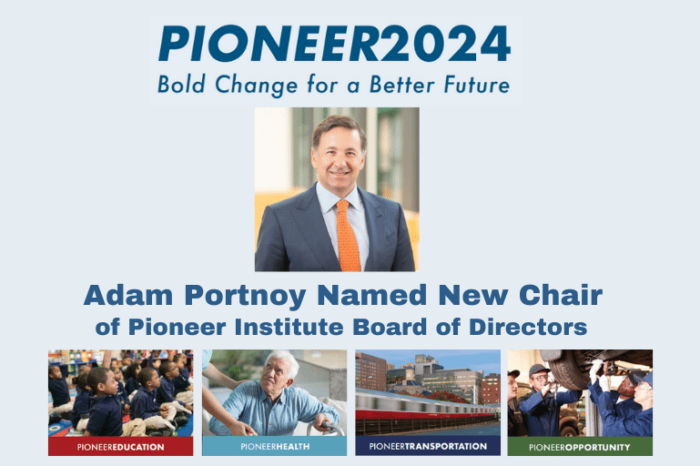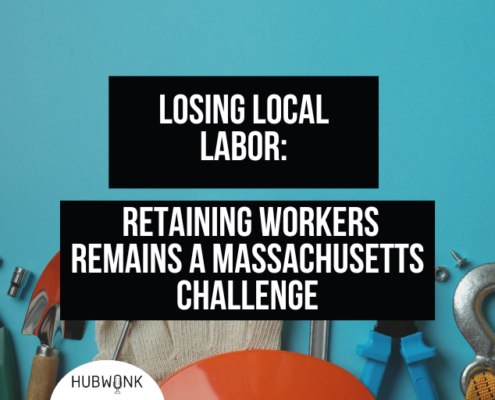Pioneer Institute Announces New Chair of the Board
BOSTON – Pioneer Institute, the leading think tank in Massachusetts with focus areas in education, health, transportation and economic opportunity, today announced the appointment of Adam Portnoy as Chair of its Board of Directors. Portnoy joined the Pioneer Board in 2018 and succeeds Stephen D. Fantone, who served as Chair from 2012. This change occurs as the Institute releases its Pioneer2024 strategic plan, which marks a new stage in Pioneer’s development and outlines initiatives to expand its public interest law activities, dramatically amplify its direct communication audience, and strengthen its policy impact.
Adam Portnoy is President and CEO of The RMR Group (Nasdaq: RMR), which is headquartered in Newton, Massachusetts. RMR is an alternative asset management company that was founded in 1986 to invest in commercial real estate and related operating businesses. RMR currently has $32.1 billion of assets under management, including more than 2,100 commercial properties located throughout North America. The companies managed by RMR collectively have nearly 42,500 employees in locations throughout the United States, including approximately 850 employees located in Massachusetts. In addition to serving on the boards of several publicly traded and privately owned companies managed by RMR, Mr. Portnoy is currently the honorary consul general of the Republic of Bulgaria to the Commonwealth of Massachusetts. Mr. Portnoy earned a Bachelor’s Degree in Public Policy from Occidental College in 1993. Mr. Portnoy has spent most of his life living in Massachusetts and he and his wife Elika currently live in Boston with their two children.
“It has been a great honor to serve as Chair of the Institute,” said Fantone, who served on the Pioneer Board for 13 years and chaired it for eight. He was voted by the board to serve in an ex-officio capacity as chair emeritus. “I am proud of our accomplishments and the institutional strength we’ve built. And 2020 was the proof point—in this unsettling year, we’ve driven big impact, continued to grow our reach, and issued a strategic plan that has earned the trust of and record-setting financial support from our community. With this Board and Adam’s leadership, Pioneer’s impact and reach will only grow. I look forward to working with Adam and the Board on many exciting new initiatives.”
“Pioneer Institute is uniquely positioned to expand educational and economic opportunities for all Massachusetts residents and I am deeply honored to serve as its Chair,” said Portnoy. “I look forward to building on the Institute’s history of impact and its brand of civil discourse and clear communications. The Board aims to accelerate our momentum—increasing Pioneer’s engagement with Massachusetts residents, significantly expanding our donor community and amplifying our impact through strategic litigation.”
Under Fantone’s leadership, the Institute significantly increased the pace of its policy successes, oversaw the expansion of its communications capacity to almost 300,000 individuals, and doubled its budget and the number of Pioneer donors. Noteworthy victories during his term include tax policy wins that maintained the state’s competitiveness, a successful national campaign against the Common Core standards, the adoption of a “soft receivership” at the MBTA, and in 2020, the U.S. Supreme Court’s agreement with the Institute’s amicus curiae brief in the landmark Espinoza case.
“This is a significant moment in the history of our organization. I’m grateful to Stephen for his dedication and commitment to Pioneer, the Commonwealth and the broader community,” said Jim Stergios, Pioneer’s executive director. “I am confident in Adam’s leadership and excited for what the future holds. In the coming weeks, we will share updates about significant new developments at the Institute.”
Mission
Pioneer Institute develops and communicates dynamic ideas that advance prosperity and a vibrant civic life in Massachusetts and beyond.
Vision
Success for Pioneer is when the citizens of our state and nation prosper and our society thrives because we enjoy world-class options in education, healthcare, transportation and economic opportunity, and when our government is limited, accountable and transparent.
Values
Pioneer believes that America is at its best when our citizenry is well-educated, committed to liberty, personal responsibility, and free enterprise, and both willing and able to test their beliefs based on facts and the free exchange of ideas.
Stay Connected!
Browse recent posts:























